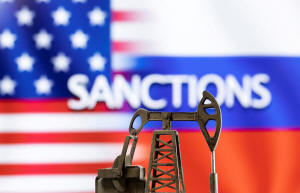US has not asked India to cut Russian oil purchases, American official
says
 Send a link to a friend
Send a link to a friend
 [April 04, 2024] By
Nidhi Verma and Krishn Kaushik [April 04, 2024] By
Nidhi Verma and Krishn Kaushik
NEW DELHI (Reuters) - The United States has not asked India to cut
Russian oil imports as the goal of sanctions and the G7-imposed $60 per
barrel price cap is to have stable global oil supplies while hitting
Moscow's revenue, an American treasury official said on Thursday.
India has emerged as one of the top buyers of Russian sea-borne oil
since Western nations imposed sanctions and halted purchases in response
to Moscow's invasion of Ukraine in February 2022.
"It is important to us to keep the oil supply on the market. But what we
want to do is limit Putin's profit from it," Eric Van Nostrand, the U.S.
Treasury's assistant secretary for economic policy said in New Delhi,
referring to Russian President Vladimir Putin.
Nostrand said that buyers can purchase Russian oil at deeper discounts
outside of the price cap mechanism, if they do not use Western services
like insurance and broking, thus limiting Moscow's sales avenues.
"They (Russia) have to sell oil for less," he said.
The sanctions are intended to limit the options available to Russia to
three: sell its oil under the price cap, offer deeper discounts to
buyers if they circumvent Western services, or shut its oil wells,
Nostrand added.
The price cap imposed by the Group of Seven (G7) wealthy nations, the
European Union and Australia bans the use of Western maritime services
such as insurance, flagging the transportation when tankers carry
Russian oil priced at or above $60 a barrel.

[to top of second column] |

A model of a pump jack is seen in front of the displayed word
"Sanctions", U.S. and Russia flag colours in this illustration taken
March 8, 2022. REUTERS/Dado Ruvic/Illustration/File Photo

Anna Morris, acting assistant secretary for terror financing at the
U.S. Treasury said that G7 nations had the option to review the
price cap depending on market conditions or other factors.
As part of its wide-ranging sanction mechanism against Russian oil
trade, the United States in February imposed sanctions on Russian
state run shipper Sovcomflot (SCF)and 14 of its crude oil tankers
involved in Russian oil transportation.
Morris said that SCF vessels that have been identified in the recent
rounds of sanctions "certainly carry with them the sanctions risk...
the 14 vessels in particular that have been named are sanctioned
vessels".
The U.S. officials are in India this week meeting with government
officials and business leaders to discuss cooperation on anti-money
laundering, countering the financing of terrorism, and
implementation of the price cap.
Asked about the sale to Western nations of refined products produced
from Russian oil, Morris said that would not breach the sanctions.
"Once Russian oil is refined, from a technical perspective it is no
longer Russian oil. If it is refined in a country and then sent
forward, from a sanctions perspective that is an import from the
country of purchase it is not an import from Russia."
(Reporting by Nidhi Verma; Editing by Emelia Sithole-Matarise)
[© 2024 Thomson Reuters. All rights
reserved.]
This material may not be published,
broadcast, rewritten or redistributed.
Thompson Reuters is solely responsible for this content. |